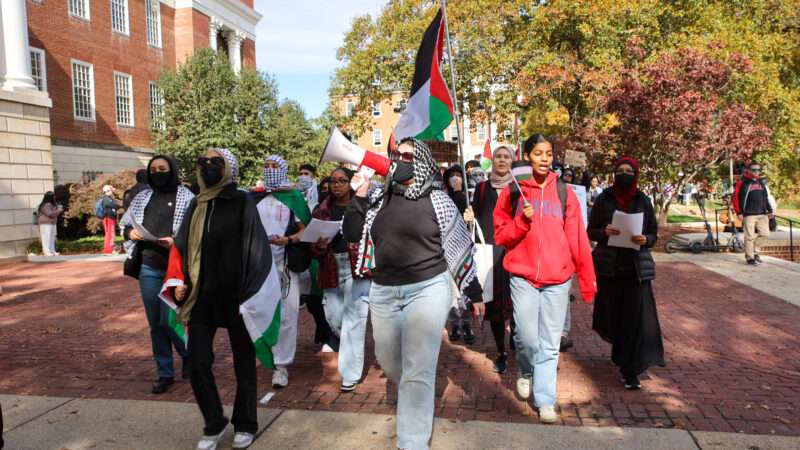
The University of Maryland is now facing a lawsuit after unilaterally canceling all student expressive activities planned for October 7. The move came after the university received "numerous calls" expressing outrage over events organized by campus pro-Palestine groups to mark the anniversary of Hamas' massacre of more than 1,000 Israeli civilians last year.
"Given the overwhelming outreach, from multiple perspectives, I requested a routine and targeted safety assessment for this day to understand the risks and safety measures associated with planned events," University of Maryland President Darryll J. Pines wrote in a statement earlier this month. While Pines noted that there was "no immediate or active threat," he still decided to "host only university-sponsored events that promote reflection on this day," with all other "expressive events" canceled.
But Pines' decision hardly had the effect of suppressing dissent. Less than two weeks after his announcement, the University of Maryland Students for Justice in Palestine (UMD-SJP) chapter filed a lawsuit against the university, arguing that Pines' cancellation of all student expressive activities on October 7 would be an obvious violation of their First Amendment rights.
"On one day next month, no student-selected speakers will be allowed to present at any of the [University System of Maryland] campuses, serving more than 150,000 students—a prior restraint so sweeping only a cataclysm could justify it," the lawsuit reads. "The First Amendment does not allow campus officials to establish free expression-black-out days, even on occasions that may be emotional or politically polarizing."
According to the suit, UMD-SJP had sought to make a reservation in July to use a university green space to "hold a vigil commemorating the thousands of lives lost since the initiation of Israel's current attack on Gaza." However, during a meeting on August 19, the university's president and vice president told the group that they "had been receiving pressure from groups inside and outside of the University to cancel UMD-SJP's reservation, but that they were committed to protecting the free speech of students," according to the suit.
After that meeting, calls to suppress student speech increased, including an online petition with more than 27,000 signatures that argued that allowing UMD-SJP's event to go forward would be like "granting permission to white supremacists to burn a cross on campus on the day commemorating the assassination of Dr. Martin Luther King Jr." By September 1, the administration's expression-protecting stance had eroded, and Pines announced that all expressive activities would be banned for the day.
In an amicus brief in support of the lawsuit from the American Civil Liberties Union, the Foundation for Individual Rights and Expression and the Knight Foundation pointed out how absurd Pines' attempt to stifle all student speech for one day is.
"The University cannot seriously purport to ban every single expressive event that might take place throughout the University of Maryland system on that day: every concert, dance, play, poetry reading, art exhibition, debate, fundraiser, club meeting, protest, etc. taking place across its campuses—even for a single day," the brief reads. "Such a ban would be impossible to enforce and would amount practically to a total shutdown of the university's core functions. Plainly, the University means to restrict expressive events about Israel and Palestine on October 7, and will enforce its ban on "expressive events" with that priority, on those contents, in mind."
"That the University's censorship applies to a single, uniquely resonant day only highlights the problem," the brief continues. "By silencing speech at its most salient moment, the restriction directly contravenes the public interest in robust, uninhibited debate. Blessing such a restriction would get the First Amendment precisely backwards."
The post University of Maryland Sued for Canceling Student 'Expressive Activity' on October 7 appeared first on Reason.com.







